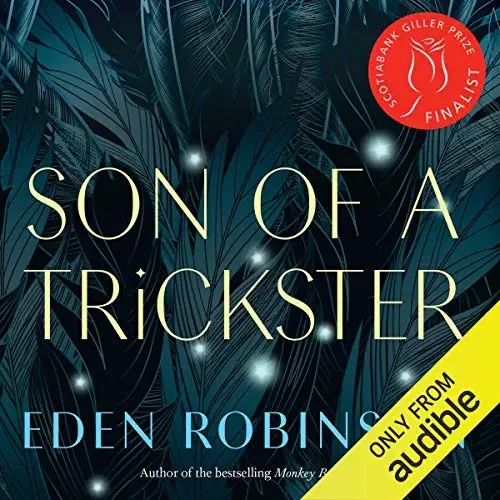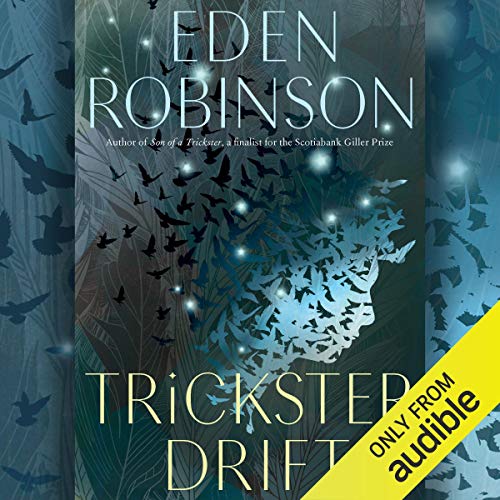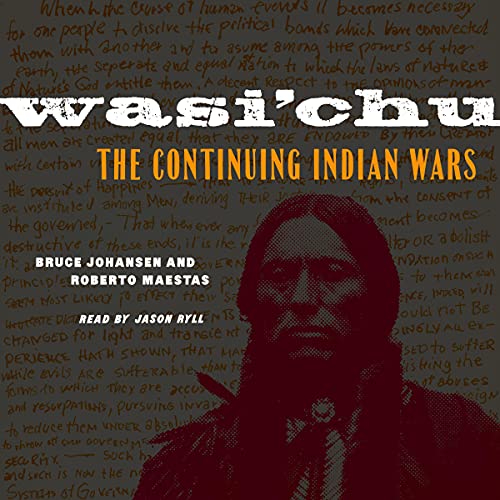Audiobooks
Check out some of the amazing audiobooks we have had the pleasure to work on.
With striking originality and precision, Eden Robinson, the Giller-shortlisted author of the classic Monkey Beach and winner of the Writers’ Trust Engel/Findley Award, blends humor with heartbreak in this compelling coming-of-age novel. Everyday teen existence meets indigenous beliefs, crazy family dynamics, and cannibalistic river otter…. The exciting first novel in her Trickster trilogy.
Everyone knows a guy like Jared: the burnout kid in high school who sells weed cookies and has a scary mom who’s often wasted and wielding some kind of weapon. Jared does smoke and drink too much, and he does make the best cookies in town, and his mom is a mess, but he’s also a kid who has an immense capacity for compassion and an impulse to watch over people more than twice his age, and he can’t rely on anyone for consistent love and support, except for his flatulent pit bull, Baby Killer (he calls her Baby) – and now she’s dead.
Jared can’t count on his mom to stay sober and stick around to take care of him. He can’t rely on his dad to pay the bills and support his new wife and step-daughter. Jared is only 16 but feels like he is the one who must stabilize his family’s life, even look out for his elderly neighbors. But he struggles to keep everything afloat…and sometimes he blacks out. And he puzzles over why his maternal grandmother has never liked him, why she says he’s the son of a trickster, that he isn’t human. Mind you, ravens speak to him – even when he’s not stoned.
You think you know Jared, but you don’t.
Saul Indian Horse is in critical condition. Sitting feeble in an alcoholism treatment facility, he is told that sharing his story will help relieve his agony. Though skeptical, he embarks on a heartbreaking journey from the present – and into the woods of Northern Ontario, where his life began in a snowy Ojibway camp. The tale that follows is one of great pain and great determination from Richard Wagamese, an author who “never seems to waste a shot” (New York Times).
After being taken forcibly from his family, Saul is placed in an abusive boarding school determined to expunge his Ojibway traditions and knowledge. But he finds salvation each morning at dawn, practicing hockey alone on the school’s makeshift ice rink. Saul’s gift is undeniable: He quickly rises from his school’s all-Ojibway team to the white-dominated regional circuit. As his skills improve and he gains notoriety, however, each of his victories on the ice is met by racism and hate. As the years pass, Saul must reconcile his passion – the game he loves, that allowed him to escape poverty – with the harshness of a world that will never make him entirely welcome.
Unfolding against the bleak loveliness of Northern Ontario – all rock, marsh, bog, and cedar – this is a singular story of resilience from a beloved storyteller.
Following the Scotiabank Giller Prize-shortlisted Son of a Trickster comes Trickster Drift, the second book in Eden Robinson’s captivating Trickster trilogy.
In an effort to keep all forms of magic at bay, Jared, 17, has quit drugs and drinking. But his troubles are not over: now he’s being stalked by David, his mom’s ex – a preppy, khaki-wearing psycho with a proclivity for rib-breaking. And his mother, Maggie, a living, breathing badass as well as a witch, can’t protect him like she used to because he’s moved away from Kitimat to Vancouver for school.
Even though he’s got a year of sobriety under his belt (no thanks to his enabling, ever-partying mom), Jared also struggles with the temptation of drinking. And he’s got to get his grades up, find a job that doesn’t involve weed cookies, and somehow live peacefully with his Aunt Mave, who has been estranged from the family ever since she tried to “rescue” him as a baby from his mother. An indigenous activist and writer, Mave smothers him with pet names and hugs, but she is blind to the real dangers that lurk around them – the spirits and supernatural activity that fill her apartment.
As the son of a Trickster, Jared is a magnet for magic, whether he hates it or not – he sees ghosts, he sees the monster moving underneath his Aunt Georgina’s skin, he sees the creature that comes out of his bedroom wall and creepily wants to suck his toes. He also still hears the Trickster in his head, and other voices too. When the David situation becomes a crisis, Jared can’t ignore his true nature any longer.
The first people who lived on the northern plains of what today is the US called themselves “Lakota”, meaning “the people”, a word which provides the semantic basis for Dakota. The first European people to meet the Lakota called them “Sioux”, a contraction of “Nadowessioux”, a now-archaic French-Canadian word meaning “snake”, or enemy.
The Lakota also used a metaphor to describe the newcomers. It was “Wasi’chu”, which means “takes the fat”, or “greedy person”. Within the modern Indian movement, “wasi’chu” has come to mean those corporations and individuals, with their governmental accomplices, that continue to covet Indian lives, land, and resources for private profit. “Wasi’chu” does not describe a race; it describes a state of mind.
This book is about resistance to that state of mind and to the economic system that rewards it.
Audiobooks
Check out some of the amazing audiobooks we have had the pleasure to work on.
With striking originality and precision, Eden Robinson, the Giller-shortlisted author of the classic Monkey Beach and winner of the Writers’ Trust Engel/Findley Award, blends humor with heartbreak in this compelling coming-of-age novel. Everyday teen existence meets indigenous beliefs, crazy family dynamics, and cannibalistic river otter…. The exciting first novel in her Trickster trilogy.
Everyone knows a guy like Jared: the burnout kid in high school who sells weed cookies and has a scary mom who’s often wasted and wielding some kind of weapon. Jared does smoke and drink too much, and he does make the best cookies in town, and his mom is a mess, but he’s also a kid who has an immense capacity for compassion and an impulse to watch over people more than twice his age, and he can’t rely on anyone for consistent love and support, except for his flatulent pit bull, Baby Killer (he calls her Baby) – and now she’s dead.
Jared can’t count on his mom to stay sober and stick around to take care of him. He can’t rely on his dad to pay the bills and support his new wife and step-daughter. Jared is only 16 but feels like he is the one who must stabilize his family’s life, even look out for his elderly neighbors. But he struggles to keep everything afloat…and sometimes he blacks out. And he puzzles over why his maternal grandmother has never liked him, why she says he’s the son of a trickster, that he isn’t human. Mind you, ravens speak to him – even when he’s not stoned.
You think you know Jared, but you don’t.
Saul Indian Horse is in critical condition. Sitting feeble in an alcoholism treatment facility, he is told that sharing his story will help relieve his agony. Though skeptical, he embarks on a heartbreaking journey from the present – and into the woods of Northern Ontario, where his life began in a snowy Ojibway camp. The tale that follows is one of great pain and great determination from Richard Wagamese, an author who “never seems to waste a shot” (New York Times).
After being taken forcibly from his family, Saul is placed in an abusive boarding school determined to expunge his Ojibway traditions and knowledge. But he finds salvation each morning at dawn, practicing hockey alone on the school’s makeshift ice rink. Saul’s gift is undeniable: He quickly rises from his school’s all-Ojibway team to the white-dominated regional circuit. As his skills improve and he gains notoriety, however, each of his victories on the ice is met by racism and hate. As the years pass, Saul must reconcile his passion – the game he loves, that allowed him to escape poverty – with the harshness of a world that will never make him entirely welcome.
Unfolding against the bleak loveliness of Northern Ontario – all rock, marsh, bog, and cedar – this is a singular story of resilience from a beloved storyteller.
Following the Scotiabank Giller Prize-shortlisted Son of a Trickster comes Trickster Drift, the second book in Eden Robinson’s captivating Trickster trilogy.
In an effort to keep all forms of magic at bay, Jared, 17, has quit drugs and drinking. But his troubles are not over: now he’s being stalked by David, his mom’s ex – a preppy, khaki-wearing psycho with a proclivity for rib-breaking. And his mother, Maggie, a living, breathing badass as well as a witch, can’t protect him like she used to because he’s moved away from Kitimat to Vancouver for school.
Even though he’s got a year of sobriety under his belt (no thanks to his enabling, ever-partying mom), Jared also struggles with the temptation of drinking. And he’s got to get his grades up, find a job that doesn’t involve weed cookies, and somehow live peacefully with his Aunt Mave, who has been estranged from the family ever since she tried to “rescue” him as a baby from his mother. An indigenous activist and writer, Mave smothers him with pet names and hugs, but she is blind to the real dangers that lurk around them – the spirits and supernatural activity that fill her apartment.
As the son of a Trickster, Jared is a magnet for magic, whether he hates it or not – he sees ghosts, he sees the monster moving underneath his Aunt Georgina’s skin, he sees the creature that comes out of his bedroom wall and creepily wants to suck his toes. He also still hears the Trickster in his head, and other voices too. When the David situation becomes a crisis, Jared can’t ignore his true nature any longer.
The first people who lived on the northern plains of what today is the US called themselves “Lakota”, meaning “the people”, a word which provides the semantic basis for Dakota. The first European people to meet the Lakota called them “Sioux”, a contraction of “Nadowessioux”, a now-archaic French-Canadian word meaning “snake”, or enemy.
The Lakota also used a metaphor to describe the newcomers. It was “Wasi’chu”, which means “takes the fat”, or “greedy person”. Within the modern Indian movement, “wasi’chu” has come to mean those corporations and individuals, with their governmental accomplices, that continue to covet Indian lives, land, and resources for private profit. “Wasi’chu” does not describe a race; it describes a state of mind.
This book is about resistance to that state of mind and to the economic system that rewards it.




